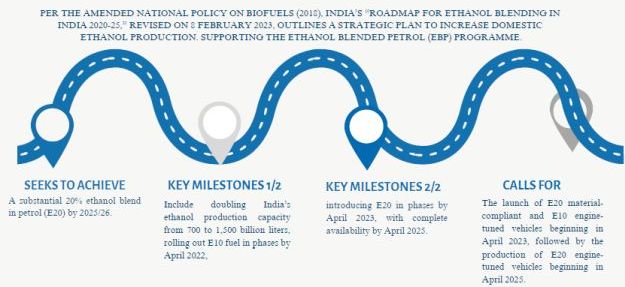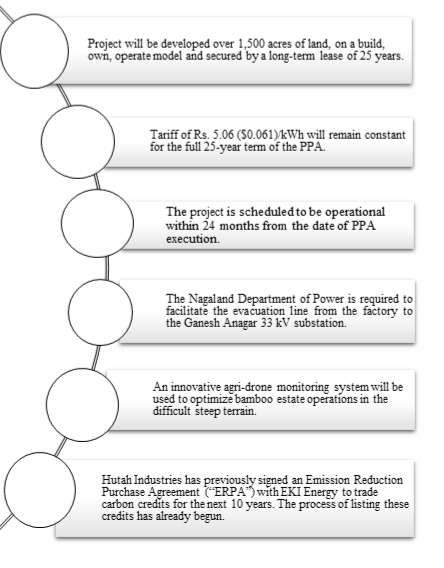In its pursuit of a sustainable future, India is at the forefront of global environmental leadership, taking an array of awareness, action, and innovation efforts. The historic announcement of the Global Biofuels Alliance (GBA) by Prime Minister Narendra Modi, as well as breakthrough innovations such as Toyota Kirloskar Motor's Electrified Flex Fuel Vehicle, illustrate India's unwavering commitment to a greener future. The GBA will further accelerate India's ongoing biofuel initiatives such as PM-JIVAN Yojana, SATAT, and GOBARdhan scheme.
At the crux of India's sustainability drive lies its steadfast dedication to ethanol, exemplified through legislative frameworks facilitating transformation. These policies yield substantial economic savings and contribute to a cleaner environment by reducing greenhouse gas emissions.
Demonstrative of this commitment biomass enterprises, such as Hutah Industries' bamboo biomass program, reflect India's dedication to sustainable electricity generation. Nonetheless, challenges remain, demanding robust infrastructure, increased awareness campaigns, and subtle policy changes. This newsletter aims to understand India's sustainability landscape by highlighting various innovative initiatives ready to transform the country's energy landscape.
SUSTAINABLE PROGRESS THROUGH REGULATION AND INNOVATION
India recognizes the importance of regulatory frameworks in guiding the country towards a more sustainable future. In India's attempts to promote sustainability, ethanol fuel and biomass initiatives are critical. Below we outline the recent government policies and initiatives aimed at strengthening these:
Ethanol Fuel:
India has extensively promoted ethanol production as a viable alternative to fossil fuels. The National Biofuel Policy, which tries to blend ethanol with petrol to minimize reliance on fossil fuels and greenhouse gas emissions, is part of India's ethanol regulation framework.
Recent Policy updates:
- The Ministry of Petroleum and Natural Gas (MoPNG) announced the Ethanol Blended Petrol (EBP) Programme 2023-25 on August 4, 2023, with a target of 20% ethanol blending in petrol by 2025.
- The government additionally implemented a variety of financial incentives to stimulate ethanol production, such as interest subventions on loans to ethanol distilleries and excise duty exemptions for ethanol produced from non-food feedstocks.
- The government has also launched the "Pradhan Mantri JI-VAN (Jaiv Indhan- Vatavaran Anukool Fasal Awashesh Nivaran) Yojana." The scheme aims to overcome the viability gap by acting as a catalyst for the establishment of 2G ethanol capacity across the country and attracting significant investments in this sector. From 2018-19 to 2023-24, twelve Integrated Bio-ethanol Projects using lignocellulosic biomass and other renewable feedstock would get significant financial support totaling Rs 1969.50 crore under this project.
- The Bihar biofuel promotion policy, 2023 aims to boost the state's 100% Ethanol and Compressed Bio- Gas (CBG)/bio-CNG manufacturing industries.
- The Bureau of Indian Standards (BIS), as India's National Standards Body, is actively contributing to the country's green initiatives by developing pertinent standards. BIS announced its alignment with the objectives of the GBA and is in the process of creating standards for paraffinic (green) diesel derived from 2G feedstock. These efforts are expected to significantly enhance biofuel production capabilities, leading to multifaceted benefits, including progress toward India's targets of achieving net zero emissions by 2070, generating 50% of energy from renewables, and supporting national initiatives like Make in India, Atmanirbhar Bharat, Waste to Wealth, and increasing farmers' income.
ROADMAP FOR ETHANOL BLENDING IN INDIA 2020-25

Promoting the cultivation of water-efficient crops, such as maize, for ethanol production and advancing the technology for ethanol production from non-food feedstocks are integral components of this transformative initiative. India has reached an average blend rate of 10% ethanol in petrol as of June 2022.
BIOMASS PROJECT
Biomass initiatives are critical to India's efforts to promote sustainability. The regulatory framework for biomass energy in the country is complicated and covers a wide range of project development factors. In India, biomass power-generating projects are directed by the National Policy on Biofuels, which encourages the use of non-food biomass sources. Furthermore, the Ministry of New and Renewable Energy (MNRE) has several schemes and incentives in place to encourage biomass energy projects such as the Biomass Power and Bagasse Cogeneration Programme and the Sustainable and Accelerated Adoption of Efficient Textile Technologies (SAATHI) scheme, which focuses on the use of biomass for thermal energy.
On August 25, 2023, Hutah Industries and the Department of Power, Nagaland signed a Power Purchase Agreement ("PPA") for a 10 MW bamboo biomass project.
This development is compatible with the recent change of the Biomass Co-Firing Policy by the Ministry of Energy. The regulation modification aims to establish baseline prices for biomass pellets used in co-firing at thermal power plants.
This modification is in reaction to evolving market conditions and the expressed desires of a diverse range of stakeholders, including thermal power plants, pellet manufacturers farmers, and financiers, among others.
Furthermore, the Madhya Pradesh Electricity Regulatory Commission has approved a price of Rs. 5.07 ($0.062) kWh for Madhya Pradesh distribution firms (DISCOMs) that receive power from biomass-based plants.
KEY HIGHLIGHTS OF THE PROJECT ARE AS FOLLOWS:

Revision of the Biomass Co-Firing Policy:
The Ministry of Power (MoP) revised the Biomass Co-Firing Policy and adopted benchmark prices for biomass pellets used in Thermal Power Plants (TPPs) to increase energy security and reduce reliance on fossil fuels. The benchmarked pricing will be implemented on January 1, 2024, to create a long-term supply mechanism that will stimulate producers, entrepreneurs, and power utilities. R.K. Singh, Union Power Minister, highlights that this strategy encourages a clearer and greener future by enhancing energy security, lowering the usage of fossil fuels, and raising farmer incomes. As of FY 23-24, about 1.80 lakh MT of biomass fuel has been co-fired in 47 thermal power stations, with significant expansion predicted.
Issues to overcome in the journey to sustainability:
As India continues on its journey to sustainability, several pressing issues need to be addressed:
Infrastructure Development:
- Transportation: India faces challenges in creating a robust transportation network for the efficient distribution of biofuels. Inadequate storage, insufficient transportation alternatives, and a lack of connectivity in the last mile must all be addressed.
- Grid Integration: As the use of renewable energy sources such as biomass grows, integrating them into the existing power system can be a difficult task. Enhancements and expenditures may be required for grid infrastructure to adequately accept variable renewable energy inputs.
- Waste Management: The waste-to-wealth effort involves converting many types of agricultural and industrial waste into profitable products. Large-scale waste management and processing involve technological, logistical, and environmental concerns that need to be addressed.
Overcoming Food Security Concerns:
- Accelerated Ethanol Goal: In June 2021, PM Narendra Modi's administration advanced India's ethanol production objective by five years, aiming for a 20% ethanol-to-gasoline blend by 2025. To achieve this goal, the government offered financial assistance to biofuel producers, resulting in the diversion of subsidized food grains intended for the poor.
- Multi-fold Benefits and Criticisms: The government estimates that the accelerated ethanol plan will save $4 billion per year by reducing petroleum imports, lowering carbon emissions, and increasing farmer income. However, some are concerned given India's history of food insecurity.
- Focus on Food-Based Feedstocks: Unlike the previous National Policy on Biofuels, which promoted grasses, algae, and cellulosic materials, the current ethanol blending plan prioritizes food-based feedstocks. Critics call for a move to a sustainable biofuels policy that focuses on ethanol made from waste products to enhance climate and air quality.
- Water Crisis and Food Grain Concerns: The ethanol policy raises concerns that it may push farmers to grow water-intensive crops, exacerbating India's already severe water deficit. Critics point to the potential struggle for subsidized food grains between distilleries and public distribution networks, putting rural people in danger of hunger. The government, on the other hand, claims that the proposal poses no risk to food security, citing the Food Corporation of India's large grain reserves.
Awareness Campaigns:
- Rural Outreach: Due to low literacy rates, language diversity, and restricted media availability, it can be difficult to extend awareness campaigns to rural communities. Finding efficient communication methods for rural populations remains a challenge.
- Behavior Change: Raising awareness is one thing; ensuring that awareness leads to substantial behavior change is another. To encourage sustainable practices, it is critical to overcome inertia and reluctance to change.
- Impact Assessment: It is critical to assess the effectiveness of public awareness initiatives and their impact on behavior. A critical challenge is the development of metrics and data collection systems to assess the effectiveness of these efforts.
Policy and Regulatory Enhancements:
- Incentive Continuation: It is a continuous concern to ensure that the incentives for biofuel production, such as subsidies and tax breaks, remain consistent. Policy stability is critical for attracting long-term investments.
- Emissions Enforcement: Strict emission standards enforcement, particularly in the industrial and transportation sectors, remains a difficulty. Monitoring and punishing non-compliant firms can be tough, necessitating a strong regulatory framework.
- Emerging Areas: Policy development that promotes sustainability in new industries, such as advanced biofuels and circular economy projects, is a growing concern. Policymakers must adapt to changing technologies and global sustainability goals.
- Cross-Sector Collaboration: Collaboration across sectors, such as energy, agriculture, and the environment, is frequently required for sustainability. Ensuring efficient cooperation and coordination between government agencies and industries is a continuing problem.
To address these issues, all stakeholders, including the government, corporations, and civil society, must work together.
CONCLUSION
India's ardent efforts to promote sustainability through awareness, action, and innovation are visible in landmark projects and legislative frameworks. The Global Biofuels Alliance (GBA), among others, showcases India's commitment to a sustainable future. Ethanol regulations, such as the Ethanol Blended Petrol Programme and the Pradhan Mantri JI-VAN Yojana, show a regulatory push towards less reliance on fossil fuels and fewer greenhouse gas emissions. However, challenges remain, such as infrastructural development, eliminating food security concerns, and implementing successful awareness campaigns. Addressing these problems requires ongoing policy support, cross-sector collaboration, and a just transition to guarantee that sustainability reaches all parts of society. India's success on this transformative road would be dependent on a healthy balance of ecological awareness and progressive action across all sectors.
The content of this article is intended to provide a general guide to the subject matter. Specialist advice should be sought about your specific circumstances.

